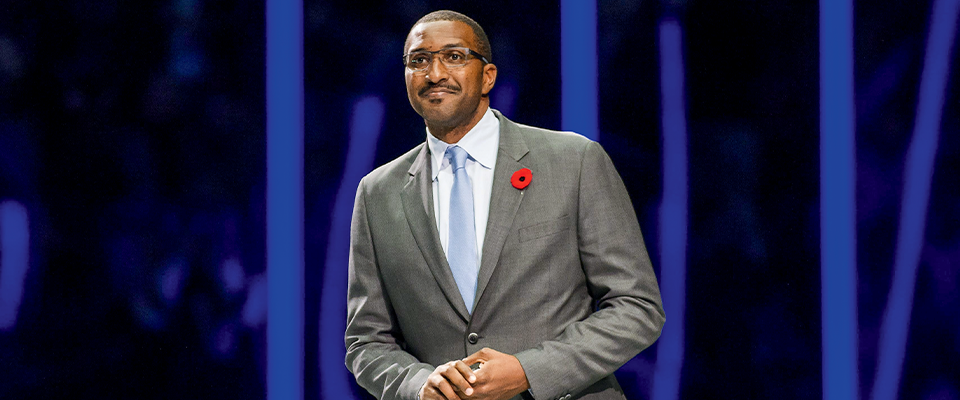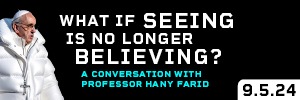A conversation with G League president Shareef Abdur-Rahim
Former Cal basketball star Shareef Abdur-Rahim was named president of the G League, the official minor league of the National Basketball Association, in 2018. Per its website, the G League operates as a research and development laboratory to prepare players, coaches, and staff for an NBA career. Under Abdur-Rahim’s leadership, it is also challenging basketball’s status quo with the implementation of a new “professional path program” for elite players who have not yet met the age requirement to be drafted into the pros. Notably, the program offers NBA-bound players an alternative to the obligatory year in the NCAA after high school—the so-called “one-and-done” rule.
Abdur-Rahim was one of those players. The Georgia native attended UC Berkeley for a single year before turning pro. Drafted third overall in 1996, he enjoyed a stellar 12-year career in the NBA, marked by first team All-Rookie honors in his debut season and an All-Star appearance in 2002. After retiring as a player, Abdur-Rahim returned to Berkeley to complete his studies, earning his degree in sociology in 2012. He has served various roles in the NBA, including associate vice president of basketball operations, before assuming leadership of the G League, which offers top young players salaries as well as personal development opportunities, including scholarships.
Bolstering the NBA’s minor leagues makes sense, Abdur-Rahim told Sports Illustrated last April. “We have kids leaving the United States—Texas and California and Georgia—to go around the world to play, and our NBA community has to travel there to scout them. That’s counterintuitive. The NBA is the best development system in the world, and those players shouldn’t have to go somewhere else to develop for a year. They should be in our development system.”
This fall, I had the opportunity to speak with Abdur-Rahim over Zoom for California. I was curious to hear his thoughts on a variety of topics, including his decision to finish his degree, the work of his charitable foundation, and the role of athletes as activists.
This interview has been edited for length and clarity.

You were a heavily recruited high school basketball player who had an incredibly successful freshman year at Cal before being taken as one of the top picks in the 1996 NBA draft. When you look back on that time what do you remember?
Shareef Abdur-Rahim: I was just excited to be in a place that I had worked to get to and dreamed of being in. My freshman year at Cal exceeded my own expectations. Seeing [fellow high school player] Kevin Garnett go pro during my senior year in high school started to make the idea of the NBA a potential reality for me. It was a surreal time. Going into my rookie year, a group of us took a picture at the rookie transition camp that turned out to be pretty legendary, as it is just a bunch of us from that era entering the NBA—guys like Kobe Bryant and Steve Nash.
You could have played much closer to home in Georgia. What made you choose Cal?
SAR: Todd Bozeman, who was Cal’s coach at that time, did an unbelievable job of making Berkeley a reality for me. I could have gone to schools like Duke or Kentucky, but he did a good job of making my mom comfortable with Berkeley. And she encouraged me to hear what he had to say. He really painted a picture of what Berkeley was like. Dr. Harry Edwards was still teaching at the time and Dr. Hamid Algar was in the Islamic studies program. Additionally, Coach Bozeman talked about the myriad of activities, activism, clubs, and groups on campus. He really helped explain the place and its history, so the decision became less about basketball.
Was there a particular course that left a strong impression on you at Cal?
SAR: Not one course in particular, but the thing I figured out later was … I’d go to the library to write a paper, and everything I am citing is from my actual professors. So I was learning that the professors at Cal were very accomplished people—all celebrities.

When I was playing at Cal it was more like 100 miles an hour, and I was trying to juggle being a college athlete and getting things done, and it was really transactional. I had to do what I had to do, because my time was short. But then, when I finished playing, and I came back to finish my degree, that was like the real experience of getting involved in study groups, and finding all the libraries, and getting to know the different professors. That was the real Berkeley experience of being able to sit, study, read, and be on campus. You know, I really valued that. That was really cool.
This year we’ve seen athletes become much more outspoken on social justice issues. And as usual there has been a lot of pushback, with some people suggesting that athletes should just stick to competing. What are your thoughts on athletes engaging in politics?
SAR: I think you have to do what is authentic to you, what you’re comfortable with. I just think it’s impossible for sports to be separate. In a lot of ways sports is a microcosm of what’s going on in broader society. You know, I heard someone say, “I see George Floyd, but that could be my younger brother. That could have been the kid I grew up across the street from.” So how can you ask that person not to have a voice? That’s not human. So, to me, it is natural, it is a part of life, being civically informed. Some people would make the case it is a civic responsibility.
We are in a time where a lot of the things that we’re discussing and advocating for aren’t new issues. COVID, in a way, has illuminated longstanding, systemic issues. There are a lot of people out of work, a lot of people are suffering and dying at a disproportionate rate. So it is illuminating things that we knew.

There has also been increased dialogue about how we, as a country, memorialize the Confederacy. What was it like attending a high school named for a Confederate general?
SAR: It was demoralizing. Now, there is another part of Atlanta where the schools were named after people like Booker T. Washington and Frederick Douglass. So that was different, but that’s in the city. The high school I was supposed to go to was Benjamin Banneker [named after the free Black almanac-maker and natural historian]. I left that neighborhood and moved north, and I ended up going to Joseph Wheeler High School.
When you think back on your first year at Berkeley, if you could go back in time, what are some things you would tell your younger self?
SAR: I would tell my younger self to be super curious, go learn and meet people. I know you love basketball, but there is other stuff going on out here. Learn as much as you can. You will be surprised how that will come back and benefit you. Be bold. The only things you are gonna regret are the opportunities you didn’t take. And, enjoy it.
The G League created the pathways program as an alternative to college basketball. You were pivotal in developing this opportunity. What do you want readers to know about it?
SAR: It’s about the empowerment of young people. More and more, we see young people demanding a different option than half a year in college. Whether they were taking a gap year, or going overseas, you saw the demand for something different.

I left school after a year, but it was an unbelievably agonizing decision. I did not, in any way, come to Cal with the idea that I would leave after a year. That was the furthest thing from my mind. I exceeded my own expectations.
I think we just have an opportunity based on all that, to provide an option to young people who are heading into the NBA. I think we also have the ability to program and create curriculum that will start to prepare them, in general, for life and, hopefully, set them up, prepare them for the ongoing journey of wanting to learn and continue to develop as a person. One of the core competencies of the G League is development. And I think people take that only as on-court development, but a big part of it has to be the off-court aspects of helping to develop and grow people.
Can you talk about the Future Foundation that you started and the work you’re doing in underserved communities?
SAR: The idea was born at Cal. A friend of mine, and a Cal alum, Hashim Ali, ran a mentoring program for kids from neighboring areas like Richmond and Oakland. He would bring them to campus and would ask me to speak with them. So from there I wanted to be able to connect with the communities that I grew up within in Atlanta. What we’ve done is we’ve created programming for young people who, in many cases, start with us in elementary school and stay with us through high school. In some cases, we go into high schools and do programming. But we started with 15 young people. We now serve around 800 young people a year. And the idea really is to bridge the gap of resources for underserved young people, mostly Black people.
It evolved with my sister Qaadirah Abdur-Rahim, also a Cal alum, who was our CEO and who was just appointed to serve as the chief equity officer of the city of Atlanta. She helped us develop this model, of creating essentially a second family for our young people.

We strive to become a somewhat complete support system. We work with young people who, after March, went to remote learning due to COVID. Ninety percent of them didn’t have Wi-Fi connectivity at home. All of them depend on free lunch and free breakfast.
We’ve been fortunate that since we started, 100 percent of the young people that worked with us graduated high school—in some cases from high schools where the graduation rate is around 40 percent. It’s hard work. You are always fundraising, programming, and innovating. And, looking back, we now have over 20 years of doing this, we have young people that went all the way through our program and have come back to volunteer with us. My wife Delicia (who I met as a student at Berkeley) and I founded the organization, and it has been extremely rewarding.
Any parting thoughts you’d like to share?
SR: When I think about my connection to Cal, and the way that I’ve grown and developed, the people that I met through the school, I can’t imagine a more fulfilling experience and relationship with a university. Just the knowledge base and resources there, everything that the University stands for.And there is room to keep growing and get better! I’ve been unbelievably fortunate to be connected to the University.
Solomon Hughes is an actor and educator in the Bay Area. He served as captain of the Cal men’s basketball team from 2001–2002. Find him on Twitter at @solomonyhughes.



















